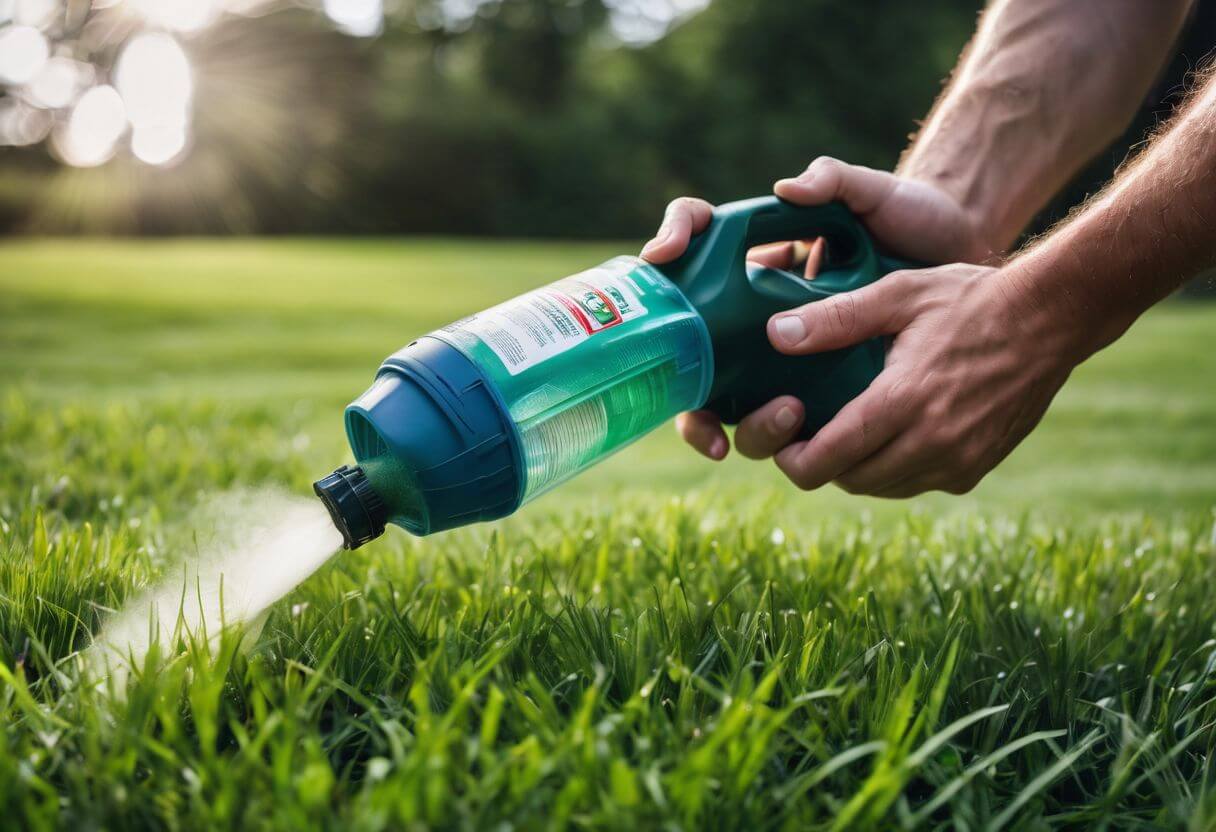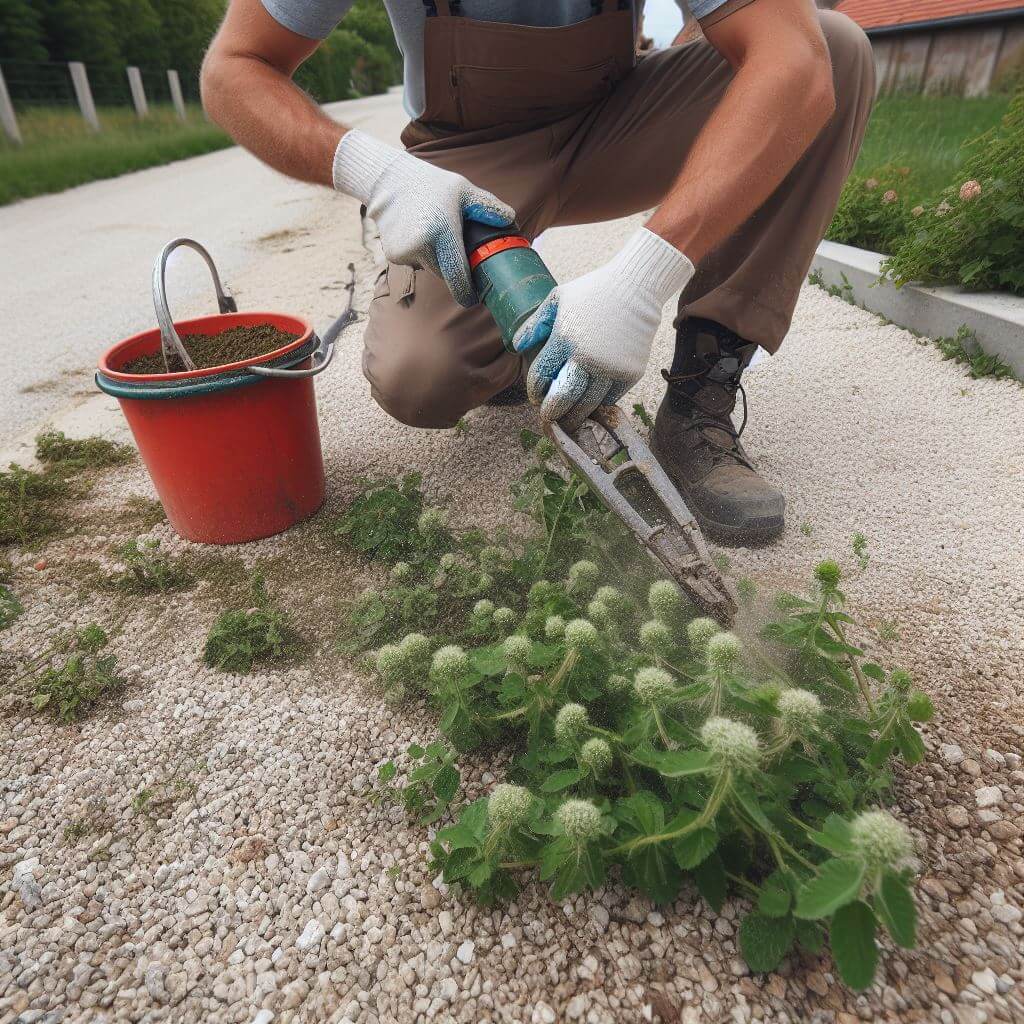- Home
- Organic Weed Killer
The Organic Weed Killer Revolution: How Organic Weed Killers are Taking Over the Market
Are you tired of watching your beautiful garden overrun by pesky weeds? You're not alone; many gardeners are turning to organic weed killers as a safe and eco-friendly solution. This blog article will demystify the trending revolution of organic weed control, equipping you with knowledge on their benefits, how they work, and why they're taking over the market.
Ready to transform your gardening techniques for a healthier ecosystem? Let's dive in!
Key Takeaways
- Organic weed killers are gaining popularity due to their non-toxic and eco-friendly ingredients, making them a safe alternative for controlling weeds.
- Chemical weed killers have harmful effects on the environment, including contaminating soil and water, harming wildlife and ecosystems, and posing health risks to humans.
- Organic weed killers offer effective weed control without compromising the safety of people, pets, or the environment.
- By choosing organic options for weed control, gardeners can contribute to sustainable agriculture practices by preserving biodiversity and improving soil health.

The Environmental Impact of Chemical Weed Killers
Chemical weed killers have a detrimental impact on the environment, leaving toxic residues in soil and water, while also harming wildlife and ecosystems.
Toxic residues in soil and water
The widespread use of chemical weed killers has resulted in the accumulation of toxic residues in our soil and water. These herbicides can leech into groundwater, contaminating drinking sources and causing harm to aquatic life.
Additionally, they degrade the quality of soil by interrupting natural nutrient cycles and killing beneficial microorganisms. Persistent exposure to such toxins may result in long-term detrimental effects on both environmental health and biodiversity.
Organic alternatives not only avoid these issues but also contribute to maintaining a healthy ecosystem balance.
Harmful effects on wildlife and ecosystems
Chemical weed killers have been found to have harmful effects on wildlife and ecosystems. These toxic substances can contaminate soil, water, and air, posing a threat to seeds,plants, animals, and microorganisms that rely on these habitats.
Wildlife may be directly exposed to these chemicals through ingestion or contact, leading to negative impacts on their health and survival. Additionally, the use of chemical herbicides can disrupt ecosystems by killing off beneficial insects and pollinators or creating imbalances in predator-prey relationships.
This can result in a loss of biodiversity and destabilization of natural habitats. It is important for organic gardeners to choose safer alternatives like organic weed killers to minimize harm to wildlife like bees and maintain healthy ecosystems.
Health risks for humans
Using chemical weed killers can pose serious health risks for humans. These products often contain harmful chemicals that can be absorbed through the skin or inhaled when sprayed. Research has shown a link between exposure to these chemicals and various health issues, including respiratory problems, skin irritations, and even certain types of cancer.
By switching to organic weed killers, you can protect yourself and your loved ones from these potential dangers. Organic herbicides are made from natural ingredients that are safe for people to use without any adverse effects on their health.
It's a smart choice to prioritize your well-being by opting for non-toxic alternatives that still effectively control weeds in your garden or yard.
What to do after spraying weed killer?
When is it too late to spray for weeds?
The Rise of Organic Weed Killers
Organic weed killers are gaining popularity due to their non-toxic and biodegradable ingredients, making them safe for people, pets, and the environment while still being effective at controlling weeds like creeping charlie
Non-toxic and biodegradable ingredients
Organic weed killers are gaining popularity among organic gardeners due to their non-toxic and biodegradable ingredients. Unlike traditional chemical herbicides, these eco-friendly alternatives do not contain harmful chemicals that can pose risks to people, pets, and the environment.
Instead, they utilize natural plant-based ingredients to effectively control weeds without causing harm. By choosing weed killers with non-toxic and biodegradable ingredients, you can ensure a safer and more environmentally conscious approach to managing your garden.
Safe for people, pets, and the environment
Organic weed killers are not only effective in controlling weeds, but they are also safe for people, pets, and the environment. Unlike chemical herbicides that can pose health risks to humans and animals, organic weed killers use non-toxic and biodegradable ingredients to target unwanted plants.
This means you can confidently use them in your garden without worrying about harmful residues contaminating the soil or water. With organic weed killers, you can have peace of mind knowing that you are taking care of your plants while protecting your loved ones and the ecosystem.
Furthermore, organic weed killers offer a safer alternative to chemical herbicides without compromising on effectiveness. These eco-friendly solutions help keep your garden free from invasive weeds while minimizing any negative impact on the environment.
By choosing organic options for weed control, you contribute to sustainable agriculture practices by preserving biodiversity and improving soil health.
So why take unnecessary risks with chemical-based products when there are safe alternatives available? Organic weed killers provide a solution that ensures the well-being of both people and nature while effectively keeping those unwanted plants at bay.
Effective weed control
Organic gardeners like you need effective weed control methods that are safe for your plants and the environment. Luckily, organic weed killers have proven to be just as powerful as their chemical counterparts.
These eco-friendly solutions use natural ingredients to target and eliminate weeds without harming beneficial plants or polluting soil and water. With their non-toxic and biodegradable formulas, organic herbicides provide a reliable way to keep unwanted plants at bay while maintaining the health and sustainability of your garden.
Say goodbye to harmful chemicals and embrace safe alternatives for effective weed control in your organic gardening practices.
Benefits of Organic Weed Killers
Organic weed killers offer a range of benefits for both your garden and the environment. From sustainable agriculture to improved soil health, discover how these safe and effective solutions are revolutionizing weed control.
Read more to uncover the advantages of organic weed killers!
Sustainable agriculture
Organic weed killers play a crucial role in promoting sustainable agriculture. By using these eco-friendly alternatives, you contribute to the preservation of biodiversity and the improvement of soil health.
Unlike chemical herbicides, organic options are safe for humans, pets, and the environment. They work effectively in controlling weeds while minimizing negative impacts on ecosystems.
With the increasing demand for safer options, the market for organic weed killers is expanding, making it easier for organic gardeners like you to practice environmentally conscious gardening and adopt sustainable farming practices.
Preservation of biodiversity
Preservation of biodiversity is one of the key benefits of using organic weed killers in your garden. Chemical herbicides can harm not only the targeted weeds but also the surrounding wildlife and ecosystems.
By choosing organic alternatives, you are contributing to the protection of insects, birds, and other animals that depend on a diverse ecosystem for their survival. This helps maintain a healthy balance in nature and ensures that our gardens remain vibrant and full of life.
Organic weed control methods prioritize the use of biodegradable ingredients derived from natural sources. These products do not pose a threat to beneficial organisms like bees, butterflies, or soil microorganisms that play crucial roles in pollination, nutrient cycling, and overall ecosystem health.
Improved soil health
Organic weed killers not only eliminate unwanted plants but also have a positive impact on soil health. Unlike chemical herbicides that can harm the soil, organic options are made from natural ingredients that nourish and improve the quality of the soil.
These eco-friendly alternatives promote beneficial microbial activity, increase nutrient availability, and enhance water retention capacity in the soil. By using organic weed killers, you can maintain a healthy ecosystem beneath your garden's surface while effectively managing weeds.
Protection of human health
Organic weed killers not only safeguard the environment but also prioritize the protection of human health. Unlike chemical alternatives, these eco-friendly solutions are made from natural ingredients that pose minimal risk to humans.
By choosing organic herbicides, you can ensure a safer gardening experience for yourself and your loved ones. With the absence of harmful chemicals, you don't have to worry about toxic residues or potential health risks associated with traditional weed control methods.
Make the switch to organic and enjoy a healthier approach to maintaining your garden.
How Organic Weed Killers Work
Organic weed killers work by using natural, plant-based ingredients that target and suppress weeds, preventing them from growing and spreading.
Mechanisms of action
Organic weed killers work through various mechanisms to effectively control and eradicate unwanted weeds. These mechanisms target the growth and development of the weeds, ensuring a safe and natural approach to maintaining your garden.
One common mechanism used by organic herbicides is the disruption of photosynthesis in plants. By interfering with the plants' ability to convert sunlight into energy, these weed killers weaken and eventually kill off the targeted weeds.
Another mechanism involves disrupting cell membranes, leading to dehydration and wilting of the weeds. Organic weed killers may also inhibit protein synthesis or interfere with essential enzyme activity in the plants, preventing their growth and reproduction.
Application methods
Applying organic weed killers is simple and straightforward. Here are some effective application methods for you to try:
- Spray directly on weeds: Gently spray the organic herbicide directly onto the unwanted weeds, making sure to cover all parts of the plant.
- Use a handheld sprayer: Pour the organic weed killer into a handheld sprayer and evenly spray it over the affected area, targeting the weeds specifically.. Learn more about the best time to spray weed killer.
- Paint or brush onto leaves: For precision targeting, use a paintbrush or sponge to apply the organic herbicide directly onto the leaves of the weeds. This method works well for larger plants with thick foliage.
- Spot-treat problem areas: Identify specific problem spots with stubborn weeds and apply the organic weed killer only in those areas. This saves time, effort, and product usage.
- Follow product instructions: Always read and follow the instructions provided by the manufacturer when applying organic weed killers. Different products may have specific guidelines regarding dilution ratios, frequency of application, and safety precautions.
Long-term weed prevention
Organic weed killers not only provide effective short-term weed control but also offer long-term prevention. By targeting the roots of weeds, these natural herbicides help to prevent new growth and minimize the need for constant reapplication.
This means less time spent on weeding and more time enjoying your organic garden. With sustainable ingredients that break down naturally over time, organic weed killers are a safe and eco-friendly solution for maintaining a weed-free garden in the long run.
You may also like: Can I spray weeds before rain
The Future of Weed Control: Embracing Organic Solutions
Organic weed control is quickly gaining momentum and becoming the future of weed control. As more people become aware of the harmful effects of chemical herbicides on the environment and human health, there is a growing demand for safer alternatives.
Organic solutions, such as non-toxic and biodegradable weed killers, are paving the way for eco-friendly gardening practices.
With advancements in organic farming and sustainable agriculture, the future holds promising developments in weed control methods. The focus is shifting towards finding effective organic herbicides that are safe for people, pets, and the environment.
Approved tools and techniques are being developed to meet the needs of organic gardeners who want to maintain healthy soil, protect biodiversity, and eliminate weeds without harmful chemicals.
As consumers continue to prioritize environmental safety and their own well-being, the market for organic weed killers will expand even further. This shift towards embracing organic solutions not only benefits our gardens but also contributes to a greener and healthier planet overall.
Remember that you have the power as an organic gardener to make a difference by choosing safe alternatives to chemical herbicides. By embracing organic solutions for weed control today such as captain Jack, you are creating a better future for your garden and our planet as a whole.
Conclusion
Organic weed killers are quickly gaining popularity as people become more conscious of the environmental and health risks associated with chemical herbicides. By opting for natural alternatives, such as The Weed Terminator by Contact Organics or products like Weed Pharm and C-Cide, gardeners can effectively control weeds without compromising the safety of themselves, their pets, or the ecosystem.
As demand continues to increase, organic weed killers are revolutionizing the market and paving the way for a greener future in gardening and agriculture.
You may like : Do I need a licence to spray weed killer? and how long does weed killer stay toxic?
FAQs
1. Are organic weed killers effective in controlling weeds?
Yes, organic weed killers can be highly effective in controlling weeds such as bermuda grass , zoysia lawn , centipede grass when used properly and consistently.
2. How do organic weed killers work?
Organic weed killers work by using natural ingredients to target and kill unwanted plants, without harmful chemicals or toxins.
3. Are organic weed killers safe for the environment?
Yes, organic weed killers are generally considered safer for the environment compared to synthetic chemical herbicides as they are biodegradable and less likely to contaminate soil or water sources.
4. Can organic weed killers be used around pets and children?
Some organic weed killer products are specifically formulated to be pet-friendly and safe for use around children. However, it is important to read product labels carefully and follow instructions for proper usage precautions.
5. What is the best weed killer for mushrooms in your lawn?
Vinegar: Dilute 4 parts water to 1 part vinegar and spray directly onto the mushrooms. The acetic acid in vinegar will kill the mushrooms or toadstools, but it may also harm the surrounding grass and plants.
More about how do you get rid of mushrooms in your lawn
30 percent vinegar weeds killer recipe to get rid of weeds safely
Is Spectracide weed killer as good as roundup?
Best weed killer for horsetail














